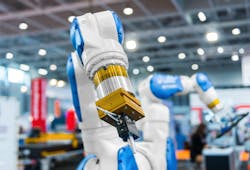Lockheed Martin Explores Use of Autonomous Robots
Xaba, a developer of robotics and CNC machine controllers driven by artificial intelligence (AI), recently completed a collaboration with Lockheed Martin around the automation of manufacturing operations using Lockheed Martin’s industrial robots integrated with Xaba’s physics-informed deep artificial neural network model, xCognition.
The two companies identified a use case focused on a typical robotics work cell used in an aerospace factory to test how Xaba’s xCognition could empower a commercial robot with greater understanding of its body and the task it is about to execute while ensuring it achieves required quality and tolerances.
The test consisted of two phases:
• Phase 1: Assessing the robot’s performance in maintaining accurate and consistent trajectory positioning with and without Xaba’s xCognition.
• Phase 2: Performing a set of drilling tests on an aluminum test plate with specified positional tolerances.
Based on the data collected by the Lockheed Martin and Xaba, xCognition improved accuracy and consistency of the commercial robot by a factor of 10x. According to Xaba, this test shows how industrial robotics augmented with xCognition can perform crucial manufacturing operations that have previously been done by CNC machines.
“The accuracy performance of a robotic system limits the type of process it can perform based on the cost efficiency of the accuracy hardware,” said Matthew Galla, applications engineer for Lockheed Martin’s Aeronautics business. “The test with the xCognition controller allows us to rethink how we can accelerate innovation in manufacturing.”
In its announcement of the collaboration with Lockheed Martin, Xaba said: “Accurate drilling historically requires expensive static machine tools, or the task is manually performed by skilled operators. Using industrial robots and collaborative robots (cobots) instead is appealing because they are much more flexible, adaptable and less costly than CNC machine tools. However, commercial industrial robotics systems have struggled to perform critical manufacturing operations such as drilling, laser welding, light machining and precise assembly. The reason for this is the lack of robotics intelligence required to deliver accuracy, repeatability and to work in path programming mode rather than point-to-point. This challenge is solved with the xCognition AI-driven control system.”

